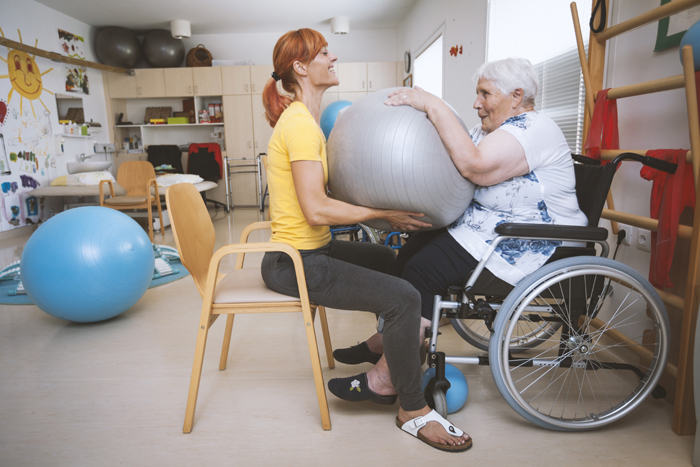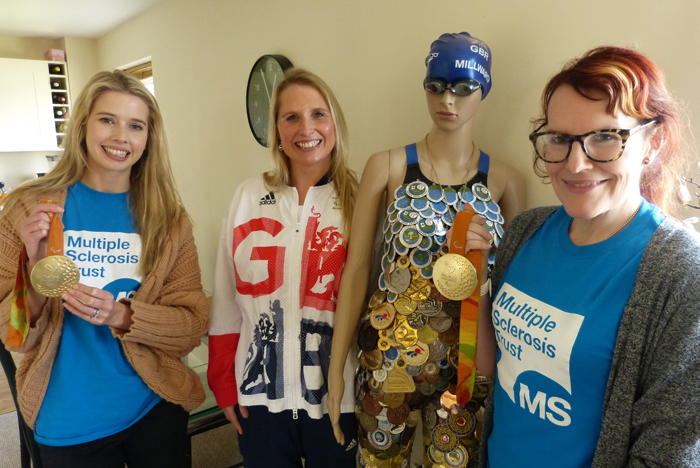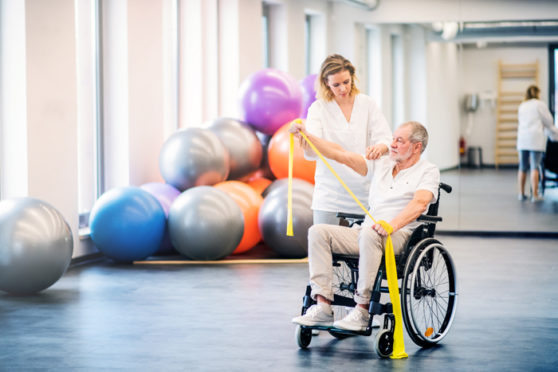This MS Awareness Week (22-28 April), the MS Trust is calling on people with MS to pop on their pumps and introduce a little activity – big or small – into their daily routine. Staying active doesn’t need to mean running marathons or going to the gym, it’s about doing it at your own level, at your own pace. Doing it YOUR way.
In the past, people with MS were advised to avoid exercise. It was felt that since many people with MS experienced fatigue and found their symptoms worsened when hot, it was best to avoid activities that could be seen as tiring. The MS Trust wants to dispel this myth.
Regular, moderate exercise is now known to be an important part of maintaining good health and wellbeing for people with MS. There is evidence that it can help with many MS symptoms, and also with general quality of life.
 A recent survey conducted by the MS Trust highlighted the positive impact exercise can have, with respondents listing improvements in their mental health, increased strength and reduction in fatigue as the main benefits of staying active with MS.
A recent survey conducted by the MS Trust highlighted the positive impact exercise can have, with respondents listing improvements in their mental health, increased strength and reduction in fatigue as the main benefits of staying active with MS.
One person with MS said, “Staying active is good for the body and mind, it also makes me feel as though I’m being proactive regarding my own health.”
Another commented, “Being active has been a lifeline for me. I firmly believe it has kept my symptoms under control.”
Throughout MS Awareness Week the MS Trust will be promoting the benefits of staying active for people with MS; encouraging the MS community to introduce activity – or continue it – on a regular basis. Walking, swimming, wheelchair basketball, dance, yoga, gardening . . . it’s all about doing it YOUR way.
The charity is also launching a series of accessible Pilates workouts, developed with a neuro-physiotherapist and adapted for people with MS. The workouts will be on the MS Trust website (mstrust.org.uk) and on YouTube (
youtube.com/mstrust
) so people can follow along at home.
Paralympic swimmer Stephanie Millward MBE, who was diagnosed with MS aged 18, is supporting the MS Trust’s latest campaign. Stephanie commented: “I fully support this incredible campaign as I know all too well the importance of activity. For me, it makes me so happy and positive but also keeps my MS symptoms in check. People will guess that I will advocate swimming and, of course, I do as I attempt to win an eleventh medal at my fourth Paralympic Games, in Tokyo 2020. But I am delighted to be given an opportunity to recommend to other people with MS, to try anything active that appeals and just see if it makes a difference.
 “Besides the pool, I use the gym three times a week, which I love and have a specific programme, but I have gained so much core-strength from a weekly horse-riding session (thanks to Riding for the Disabled) and only this year was I introduced to yoga. To anyone reading this, I urge you to try some exercise, no matter what it is. Following my MS diagnosis in 1999, I did nothing for the best part of eight years – literally nothing and suffered as a consequence – until I was persuaded to get back into a pool. Please try some gentle exercise and don’t make the same mistake I did for all those years – good luck!”
“Besides the pool, I use the gym three times a week, which I love and have a specific programme, but I have gained so much core-strength from a weekly horse-riding session (thanks to Riding for the Disabled) and only this year was I introduced to yoga. To anyone reading this, I urge you to try some exercise, no matter what it is. Following my MS diagnosis in 1999, I did nothing for the best part of eight years – literally nothing and suffered as a consequence – until I was persuaded to get back into a pool. Please try some gentle exercise and don’t make the same mistake I did for all those years – good luck!”
David Martin, CEO of the MS Trust, added: “Research shows us that regular and moderate exercise has many benefits for people living with MS, both physically and mentally. We hope that by shining a spotlight on exercise during MS Awareness Week, we can encourage people with MS all over the UK to introduce a little activity into their daily routine.
“We recognise that MS can affect people in many different ways and not everyone will be able to go for a run, get to a pool, or go to the gym, so our campaign is all about making exercise as accessible as possible.”
Multiple sclerosis: 10 facts about MS
- MS is a disease affecting the central nervous system (the brain and spinal cord)
- Around 110,000 people in the UK have MS
- MS is the most common condition of the central nervous system affecting young adults
- MS is a lifelong condition but it is not a terminal illness
- Everyone’s MS is different so no two people will have the same range and severity of symptoms, even if they are closely related
- MS is more common in countries further north or south from the equator
- MS is nearly three times more common in women than men
- It is usually diagnosed when people are in their 20s and 30s but can be diagnosed in younger and older people.
- MS is not inherited, but family members do have a slightly higher risk of developing MS
- There are treatments for the symptoms of MS although the condition can’t currently be cured.
Who are the MS Trust?
The MS Trust is a charity which works to make a difference today for the 110,000 people living with MS in the UK.
We produce practical, reliable information, online and in print, and offer a telephone and email enquiry service to anyone who needs to know more about MS.
We fight to make sure everyone affected by MS can access good quality, specialist care. We offer a full range of support to both specialists and health professionals with an interest in MS, including online information, publications, newsletters and professional development.
We work in partnership with health professionals to improve MS services now and in the future, and we fund MS specialist nurses in the areas of greatest need.
Find out more about our work supporting everyone affected by MS at mstrust.org.uk
Find us on Facebook: facebook.com/mstrustuk
Twitter: twitter.com/MSTrust
and Instagram: instagram.com/ms_trust
